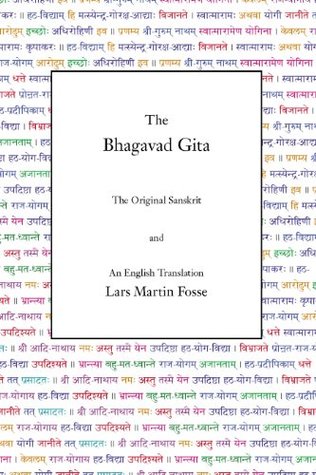More on this book
Community
Kindle Notes & Highlights
If even a man of wicked conduct worships me with singular devotion, he should be regarded as good, for he has the right conviction.
His self becomes righteous quickly and he finds lasting peace. Be aware of this, Son of Kunti: No devotee of mine is lost.
Of the Adityas, I am Vishnu; of the celestial lights, I am the radiant sun. I am Marici among the Maruts; amidst the constellations, I am the moon. Among the Vedas, I am the Samaveda; among the gods, I am Vasava; among the senses, I am the mind; and among the beings, I am consciousness.
The Lord said, ‘I am Time, full-grown destroyer of worlds, ready to annihilate these worlds. Except for you, none of the warriors arrayed in these hostile armies shall remain alive.
These men have already been killed by me; you shall merely be my instrument, left-handed archer!
But with exclusive devotion, I can be known truly, seen thus, and entered into,
The man devoted to me, with malice toward none, friendly and compassionate, nonpossessive, without ego-consciousness, feeling the same about pleasure and pain, patient, always content, a yogi, his self controlled, his resolve firm, and with his intellect and mind fixed on me, he is dear to me.
He whom the world does not vex, and who does not vex the world, who is free from joy and anger, fear and vexation, he is dear to me.
The man devoted to me who is impartial, incorruptible, capable, uninvolved, untroubled, and who relinquishes all self-interested undertakings, he is dear to me.
The devotee who neither rejoices nor hates nor mourns nor desires, relinquishing good and evil, he is dear to me.
The devotee who is the same to enemy and ally, in honor or dishonor, the same in heat or cold, pleasure or pain, free from attachment, indifferent to praise and blame, taciturn, content with anything, homeless, with a steady mind—that man is dear to me.
He who sees that actions are always performed by primordial nature alone, and that the self does not act, he sees indeed.
Among these properties, clarity causes illumination and good health because it is pure. It binds the soul through attachment to joy and knowledge, blameless Prince.
Know that agitation is characterized by passion, which arises from attachment to desire. It binds the embodied soul through attachment to action,
And know that sluggishness, born of ignorance, deludes all embodied souls. It binds through negligence, sloth, and sleep, Bharata.
Clarity attaches one to joy, agitation to action, Bharata. But sluggishness, veiling knowledge, attaches one to negligence.
Arjuna said, ‘By which marks is he who has transcended the three properties characterized, Lord? How does he behave? And how does he overcome these three properties?’
‘He who does not abhor illumination, activity, or even delusion when they happen, Son of Pandu, nor desires them when they cease, who, sitting like an uninvolved king, unperturbed by the properties, holding on to the thought, “It is only the properties that are acting,” he is not moved.
The same in pain and joy, self-contained, regarding a lump of clay, a stone, and a piece of gold as the same, the same in pleasure and unpleasantness, firm of mind, seeing no difference between praise and blame, the same in honor and dishonor,
the same to friend and foe alike, having relinquished all undertakings—he is said to have transcended the properties.
am rich, of noble birth—who is my equal? I will sacrifice, I will be generous, I will be merry!” Thus they think, deluded by ignorance.
puffed up, intoxicated by wealth and arrogance, they sacrifice with sacrifices that are so in name only, full of hypocrisy, and without following the proper ritual rules.
Three factors incite action: knowledge, the object of knowledge, and the knower. Action is the combined effect of three factors: the instrument, the action, and the agent.
That action is said to be dominated by clarity which is obligatory, devoid of attachment, and performed without love or hatred by a person who does not wish rewards.
That action is said to be dominated by agitation which is performed with much labor by a person who wishes to gratify his desires, or who acts with an egocentric attitude.
The man whose mind is not attached to anything, whose self is conquered, his desire gone, he attains through renunciation the ultimate perfection of freedom from karma.
Endowed with a pure intellect, resolutely controlling his self, relinquishing sense objects such as sound while rejecting attraction and aversion, dwelling in solitude, eating little, with speech, body, and mind under control, always intent upon the discipline of meditation, ruled by dispassion, renouncing ego-consciousness, force, arrogance, desire, anger, and possessions, unselfish, and tranquil, he is made fit to become Brahman.


